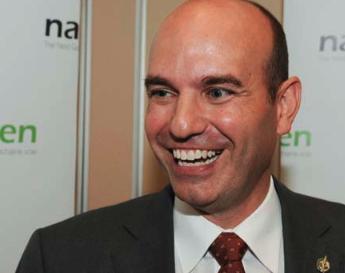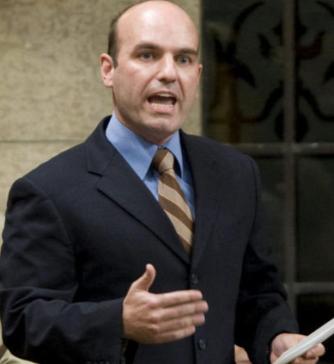
Nathan Cullen says Canadian Blood Services needs to 'wake up' and end its gay blood ban.
Federal NDP leadership hopeful Nathan Cullen casts himself as a pragmatist, a challenger of orthodoxies and ideological narrow-mindedness, and “a willing ally and partner” to the queer community. Cullen, who grew up in Toronto, is the MP for Skeena–Bulkley Valley in BC, having won the riding in 2004, beating the Conservative incumbent.
Cullen spoke with Xtra’s Natasha Barsotti recently about his much-talked-about proposal for a Liberal/NDP partnership to take on the Conservatives in the next election, the still-unfolding story about flight-screening regulations that could affect trans air travellers, Canada’s role in advocating for queer rights globally, civil libertarians’ fears about an increasingly surveillance-oriented society, and the contentious debate over the Enbridge and Keystone pipeline projects.
Xtra: What do you think are the key priorities of Canada’s queer community?
Nathan Cullen: I’m not sure they’re all that dramatically different from Canadians’ top priorities. I think sometimes what happens with the LGBT community is that they get pandered to, and issues get segregated and put off as particularly different. I think the gay and lesbian friends of mine that work on this campaign and have worked with me in politics care about the economy and the environment as much as any other Canadian. Of course, there are some particular human rights issues, many of which have been front and centre for the last couple of years, finally, and the work’s not done.
What do you see as the issues that are outstanding for the community?
I think there’s still a latent misunderstanding, sometimes homophobia, within the political class in Ottawa, particularly within the Conservative Party. A complete misunderstanding bordering on ignorance that confuses and frustrates many within the community. It’s not an outright hostility, but there’s this undertone, if you know what I mean; there’s this subtext to some of the things that are said. You have to shake your head or remind yourself that you’re actually in 2012, having to fight for basic equality, basic rights and understanding of society. There’s a difference between tolerance and acceptance. Tolerance gives you a notion that you’re just tolerating things. We don’t need tolerance, we need acceptance.
What’s your position about concerns that transgender Canadians may be grounded from air travel because of changes to flight-screening regulations?
You pray and hope that it’s just an oversight, that someone hasn’t gone out and explicitly targeted this community. I find it baffling, to be honest with you. You wonder, really, is this the conversation we most need to have right now? Is this the top priority for this government?
Is Bill C-389, which would put gender identity and expression into the Canadian Human Rights Act and the hate crimes sections of the criminal code a priority if you became prime minister?
Yeah, I’m certainly hoping to. I voted for it, and it’s something that we’d give due consideration to. I like to 360 around an issue. I like to say, Is this the best path? Is this the most effective way to get what it is that we want done? And if it is, then let’s proceed. I’m ultimately a pragmatist; I don’t die on ideological hills. I want to see things get better for people. I want to see us grow together as a country and understand one another better. Whatever the best route offered, that’s the route I tend to take.
Britain recently lifted a ban on men who have sex with men (MSM) donating blood. The Canadian Blood Services has committed only to a review of the current ban in Canada. As NDP leader will you push for the lifting of the ban?
Yeah. It’s an insulting criteria to say that anybody who has same-sex relationships is automatically a threat and risk to society. This is essentially what they’ve been saying. It’s a poor screen. They wouldn’t do it along racial lines. I can’t believe they would do it along sexual orientation. The blood services group has to wake up a little and stop pandering these most narrow and restrictive views on how the world actually works.
Hillary Clinton made a landmark speech saying gay rights are human rights. Ban Ki-Moon of the UN has made several speeches to the same effect. The Commonwealth has been positive. A lot of positive noises coming from the higher-ups in these major international institutions. What do you think Canada’s role should be in advocating for queer rights globally?
We should be leading the charge as opposed to staying silent. I mean, there’s been the odd muttering from Minister Baird but nothing of any significance, and clearly not staking out any ground to push the world further. It’s instructive how silent Canada was on some of the laws being cast in Africa at the behest of the evangelical movement in the US, and Canada just pretended like this thing just simply wasn’t happening. Well, it’s absolutely happening. Our government likes to engage itself in international issues but only, it seems to be, at their convenience.
What would your approach be to countries like Uganda or Jamaica? The UK’s David Cameron has spoken about tying aid to human rights violations, withholding aid. Is that the road Canada should follow?
I think it needs to be considered. In the same breath as Canada condemns regimes like Syria, we send trade missions over. It smacks of that hypocrisy that I spoke of earlier, and for this government, business interests trump all else. Our aid has been corrupted, I think, by this government, highly politicized. That is actually a policy role reversal for Harper. He at one point believed that human rights and trade needed to be combined, and since the oil lobby has gotten ahold of him more fully, that seems to have disappeared as a morality for him.
The BC Civil Liberties Association has raised concerns about the federal government’s proposed lawful access legislation that would increase police ability to intercept private communications and access electronically stored personal information. What’s your reaction?
The cause may be noble because a lot of this legislation is being borne out of people who traffic and create child pornography. There may be no other issue that can drive my interests in clamping down on some of the abuse that goes on to children in our country and around the world for the sake of this industry. While the intention is important, how you do it is incredibly important, not to destroy civil rights along the way. I think the civil liberties union has a point; I think there are mechanisms available to police right now that require them conferring with a judge. I think that’s a safeguard Canadians need on our rights, because you don’t protect one group of Canadians while threatening and ruining the rights of another.
You have attracted some criticism for your proposal about having Liberals join forces with NDP in the next election. Given the electoral boost the NDP received last election, why do you want to join forces with another party instead of building on what you have already?
NC: I think it does build on what we have. The strong showing we had in the last election allows us to lead this conversation. I want to get things done. I’m a pragmatist, I want to improve human rights. I want to take the country in a much better direction for the environment, for the economy, and all the things we just spoke about. We have a clear and present danger in front of us in this government, who will do everything and anything to hold on to power. So I’ve offered a one-time suggestion that we, in certain ridings we cooperate, which I think is a Canadian value. I think Canadians like it when we cooperate as political parties and try to work together for a common cause. I like challenging orthodoxies; I like challenging ideology and saying for 50 years, New Democrats have asked Canadians to think different. It’s also fair for us to ask that question of ourselves.
When you’ve pitched this to constituents, to the broader party, are you getting support for this plan?
Yeah. There’s two groups. There’s those that are so-called diehard New Democrats that’ve been with the party a long time. There’s a general sweep who are reluctant to the idea, but every time Mr Harper does something, one more evil thing, they open up a little more to this suggestion. The second group is a much larger group and that’s part of that progressive majority who despair at what they’re seeing every day from their government and want to do something about it right now. They’re very open to this idea and have been from the very beginning. So I’m having two conversations at the same time, and every room I go into across this country has those two groups in the room at the same time.
You’ve been the NDP’s environment and resources critic. What’s your perspective on the contentious pipeline projects, Enbridge and also the Keystone, which US President Obama recently gave the kibosh to?
NC: Temporary kibosh . . . I think it’s economic and environmental suicide. I’m in Alberta today and saying the same thing. I think environmentally it allows the oil sands to expand completely out of control. Economically, it leaves more than 20,000 jobs for somebody else to create in other countries, so we’re not adding any value. I live in Northern BC, the government has a policy for raw log export and it’s killing us. I watch mill after mill close and families break up and have to move. We have to be stewards of this place. This endowment is offered to us as Canadians, and I feel like we’re wasting it and only listening to oil companies.
What’s your vision for an alternative to these megaprojects? They’re being portrayed as potential drivers of economic growth and employment.
We know the only industry during the last economic downturn that did well was the green energy sector. It was the only one nationally and globally to continue to grow. It makes us more efficient, makes us more competitive. The government’s response has been to kill successful programs like the eco retrofit program. This is ideology getting in the way of good policy, and it’s not as if these industries need a big hand. They just need a government that’s not hostile, and we have a government right now that is ideologically opposed to their very existence. I think we need that revolution. We need that economic and energy revolution to happen here.


 Why you can trust Xtra
Why you can trust Xtra


